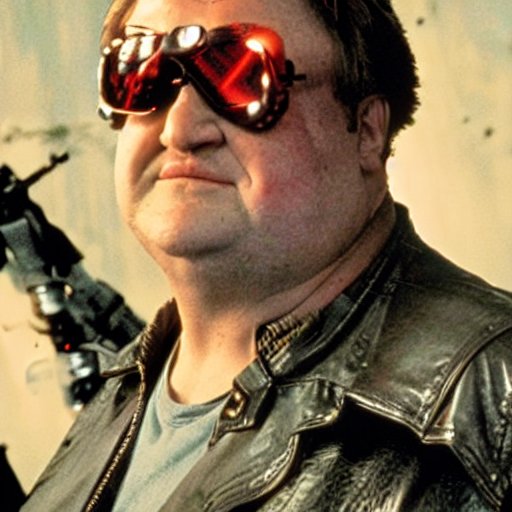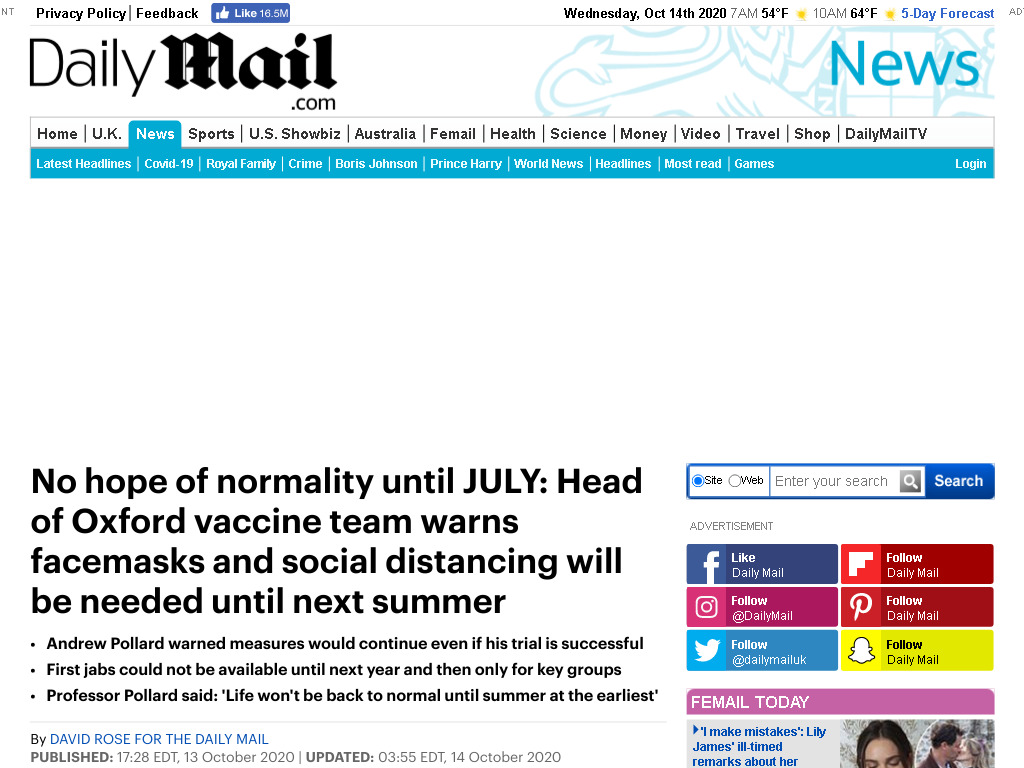Facemasks and social distancing will be needed until next summer, the head of Oxford's vaccine trial team said last night.
Andrew Pollard warned strict rules would have to be followed even if global tests proved successful. He said the first jabs would probably not be available until next year – and then only for key groups such as frontline health workers.
Professor Pollard said that he hoped the final trials could be completed by the end of this year but added: 'Life won't be back to normal until summer at the earliest. We may need masks until July.
If we end up with a vaccine that's effective in preventing the disease, that is by far the best way to control the virus. But in the medium term, we'll still need better treatments. When does life get back to normal? Even if we had enough vaccine for everyone, in my view it's unlikely that we're going to very rapidly be in a position where the physical distancing rules can be just dropped.
'Until we've got a high level of immunity in the population so that we can stop the virus so most vulnerable people are immune, there is going to be a risk. Initially, we're going to be in a position where mask-wearing and social distancing don't change.
'Only when there is a big drop in serious cases will governments feel able to relax these measures. This is a very easily transmissible virus.'
The Oxford University vaccine, produced with drugs giant Astrazeneca, is one of only nine to have reached phase three trials, the final stage before implementation, and is widely seen as the leading candidate to deliver.
In his remarks to an online seminar with Oxford alumni, Professor Pollard explained that, if successful, the vaccine will need approval from the Medicines and Healthcare products Regulatory Agency.
He said: 'Once we have the trial results, I can't imagine they will do that overnight.
'They will have to scrutinise the data very carefully – the public would not expect any less.'
The final evaluation, he said, is likely to take weeks, even though he and his team have begun a 'rolling programme' to give the regulatory agency access to the trials while in progress.
Rolling out the vaccine will pose a 'huge logistical challenge', the professor pointed out.
In his remarks to an online seminar with Oxford alumni, Professor Pollard explained that, if successful, the vaccine will need approval from the Medicines and Healthcare products Regulatory Agency.
He said: 'Once we have the trial results, I can't imagine they will do that overnight.
'They will have to scrutinise the data very carefully – the public would not expect any less.'
The final evaluation, he said, is likely to take weeks, even though he and his team have begun a 'rolling programme' to give the regulatory agency access to the trials while in progress.
Rolling out the vaccine will pose a 'huge logistical challenge', the professor pointed out.
Oxford's vaccine is based on a genetically engineered type of coronavirus that gives chimpanzees a form of the common cold.
Trials of the jab involve 20,000 volunteers in Britain and other countries being given either the vaccine or a harmless placebo.
Professor Pollard said early results had shown that the vaccine causes the body to make antibodies against Covid, and that these last for at least three months.
Tests on volunteers given the jab in April will soon show whether they lasted for six months. 'The evidence so far in the lab is that the antibodies are able to stop the virus in its tracks,' said Professor Pollard.
At least one person in the trial has become seriously ill, and has had to be hospitalised with the disease, he added.
Kate Bingham, head of the UK Vaccine Taskforce, said there was only a 'slim' chance the Oxford jab could be ready by Christmas.
She said she felt optimistic from the data seen so far in trials. But she warned against assuming a Covid-19 vaccine would be better than flu jabs, which are only around 50 per cent effective.
'It's most likely that it'll be next year,' she added.



I was watching the NZ vs AUS rugby match last Saturday night. It was shocking to see a stadium full of people standing should to shoulder and not a mask in sight. The problem I have with comparisons between the US and NZ is that is apples to oranges. NZ has an equivalent population, land mass, and population density to Colorado. They also have 100% maritime borders which makes containment significantly easier.
If Vietnam can eradicate covid, which is a country bordering China, with a high population density, and also much poorer than other countries, any western country can. They could literally just copy aspects of Vietnam's plan, it's not like it's a huge secret or something. It's just that there's a lack of will to do so, for whatever reason
How did Vietnam do so well? You hear obviously about the stuff that went down in China but I haven’t heard much about Vietnam tbh
They literally shut everything down and told everyone to stay inside except for a few people who were tested regularly who brought food to everyone else. The shut down lasted less than a month, and they were back to normal. They also were very strict about letting people in afterwards. If the whole planet did the same thing they did, the virus would have been dealt with by the end of March.
But have you considered: line go down
deleted by creator
deleted by creator
Fair point